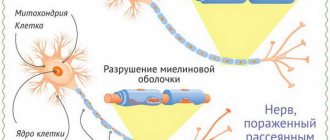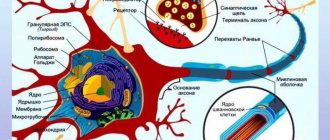Weakness in the legs or sudden awkwardness in movement after a hot bath may be symptoms of multiple sclerosis, an autoimmune disease of the nervous system that can lead to complete paralysis and blindness. In Russia, it is still confused with senile dementia and they are very surprised that both active young people and children are susceptible to it. On May 30, the International Day against Multiple Sclerosis, co-chairman of the All-Russian Union of Patients and president of the All-Russian Organization of Disabled Persons with Multiple Sclerosis, Yan Vlasov, told Taki Dela how patients with this disease live and what symptoms they need to pay attention to.
Photomicrography of the destruction of the myelin sheath of neurons of the nervous systemPhoto: Marvin 101/Wikipedia.org Yan Vlasov, MD, co-chairman of the All-Russian Union of Patients and President of the All-Russian Organization of Disabled Persons with Multiple SclerosisPhoto: from personal archive
What is multiple sclerosis
In multiple sclerosis, the immune system malfunctions and begins to attack the brain, damaging nerve cells. Sclerotic plaques - the connective tissue that remains at the site of such injuries - can appear in any part of the brain and spinal cord, which is why the disease is called multiple sclerosis.
Multiple sclerosis can develop in different ways: in one patient, exacerbations will be followed by complete or partial improvements, while in another, the disease will lead to complete paralysis within ten years. Scientists still do not know exactly why multiple sclerosis appears, but it is known that stress and strong negative experiences worsen the condition of patients, and positive emotions improve them.
In Russia, according to patient organizations, there are 150 thousand people with multiple sclerosis. The Ministry of Health register has three times less, just over 51 thousand people. This discrepancy appears because regional ministries of health, when providing data to the federal department, may take into account patients whose disease has progressed so far that medications will no longer help them, or may not take them into account.
Samurai Spirit
It seems that Alexander Kontsevoy’s day is scheduled to the minute.
Always something to do. A free “window” for the journalist was found only before training. Three times a week after work, he goes to the gym and learns jujitsu, the martial art of the samurai. Looking at the kimono-clad martial artist, it’s hard to believe that this man could barely move four years ago. “I’ve known Sasha for ten years,” said World Jiu-Jitsu Federation instructor Arthur Ochapovsky. “He started studying with us even before the army. After the service, we met him by chance on the street; he seemed to be in good health. And then he disappeared from sight. He appeared again about two years ago and asked if he could continue training. We are now engaged in the applied aspect - self-defense using the jiu-jitsu system. The guy's spirit is fine. You can feel the inner core.
The first alarm bell rang for Sasha in 2010, when he was in the army. A strong, athletic guy could not run three kilometers. Exercises and drill training became a real punishment. In the heat, terrible fatigue suddenly fell on him, coordination of movements was impaired, and his vision decreased. After the service, my health began to deteriorate. Sasha went to the doctors. I visited almost all neurologists in municipal and paid clinics in Kurgan. But there they just shrugged their shoulders. A gloomy future loomed ahead: crutches, and then a wheelchair.
“They can only help you in Moscow, St. Petersburg, Yekaterinburg and other large cities,” said a compassionate doctor in one respected medical institution.
By that time, Sasha could practically no longer walk. Climbing the stairs was especially difficult. To go down, he first placed one foot on the step and only after making sure that it was firmly “fixed” did he move the other. And when one day, sitting in a chair, I could not cross my legs, I realized: I urgently needed to look for a good specialist.
His friend Dmitry had long ago strongly advised him to go to Chelyabinsk to see a doctor he knew. She pulled Dima out, one might say, from the other world when he was in a coma for 25 days. Sasha decided: let's go! In Chelyabinsk he was first diagnosed with multiple sclerosis.
Multiple sclerosis is a disease of the central nervous system. It has nothing to do with senile sclerosis, when memory is impaired and a person becomes inattentive and absent-minded. As the researchers write, sclerosis means a scar, and disseminated means multiple. The disease mainly affects young people from 20 to 40 years old, often placing them in a wheelchair. But no one can say for sure where the disease comes from.
How does multiple sclerosis manifest?
Multiple sclerosis is often called “the disease with a thousand faces” because its symptoms are not specific and can come and go.
“This is weakness in the limbs, especially worse after taking a hot bath or sauna, sudden attacks of incoordination without dizziness, recurrent visual impairment...,” lists Yan Vlasov. “All these symptoms are like a touch, they can even change during the day, they should alert a neurologist - this is where multiple sclerosis begins.”
It is a big mistake on the part of patients and their environment not to take these symptoms seriously and postpone a visit to a neurologist. If the doctor doubts the diagnosis, he can refer the patient to a center for help with multiple sclerosis. Information on regions can be found on the website of the All-Russian Public Organization of Disabled Persons with Multiple Sclerosis.
The hospital can diagnose multiple sclerosis within a maximum of three months - and this is a big step forward, because until recently the diagnosis took several years. But this level of medicine is available only in large cities; in rural settlements and small towns there are often no specialized specialists and the necessary equipment.
For almost twenty years, the Russian Committee of Multiple Sclerosis Researchers has been traveling to different regions and holding two-day schools there on all aspects of the treatment and diagnosis of multiple sclerosis. Thanks to this, there have been fewer cases where a sick person from a small town found out his diagnosis only a year or three after the first manifestation.
“We really hope that in the next six years they will create a system for standardizing specialized medical care specifically for patients with multiple sclerosis,” says Yan Vlasov. — If we create a standardization system, create first-, second-, third-level medical institutions that deal with this problem, we will be able to easily cover rural areas, and yet two-thirds of our citizens live there. [Currently] the number of part-time jobs there is very high, the equipment available is low, and to the nearest populated area where there is - I’m not talking about a tomograph, at least a specialized specialist! - 500 kilometers each.”
Kilometer of “shame”
After treatment in Chelyabinsk, Sasha felt better. He began to walk normally. I introduced into my schedule daily hour-long walks, exercises for the vestibular system, training for coordination, balance and motor skills. In June 2014, I decided to try running for the first time in three years. He specially came to the Central Park of Culture and Culture early on Saturday morning so that no one would see his “shame.” One lap (about a kilometer) was run with five stops. He remembers how he constantly skidded, turned sideways, his feet treacherously spanked, as if his muscles were not holding them up. After two months of hard training on weekends, Alexander began to achieve something similar to easy running. And then the first achievements appeared. In September, he already covered three kilometers in 18 minutes and did 17 pull-ups. There was progress. When I came to the Southern Urals to see my doctor, she was satisfied.
Tyson has a catchphrase: “When you rise, your friends see what you are worth, when you fall, you see what your friends are worth.”
To consolidate his success, the guy decided to go on skates. He used to skate well. And when he was struck down by illness, he left this business. True, I tried to go out on the ice once, but I just stood by the side for an hour. I didn't dare. I decided to catch up. Already at the sixth training session, I confidently drove 26 laps around the court in 40 minutes. At home he plays chess with a computer, learns to think and predict the situation several moves ahead. He even taught his mother Marina to play chess. He can’t imagine how his life would have turned out without his mother’s support.
In Kurgan I had to register as sick. It turned out that he was not the only one in the city. One day Sasha met a young woman in the hospital who, like him, suffered from multiple sclerosis. From the conversation it became clear that they had a lot in common. The only difference is that she has come to terms with her situation, and he has not. A new acquaintance hardly walks - her husband drives her, and her twelve-year-old son habitually supports her by the arm. He is on the third disability group and often goes on sick leave at work. A colleague in misfortune was very surprised that Sasha did not register a group: is it really too much money? The money, of course, is not extra, but he doesn’t want to be disabled.
How is multiple sclerosis treated?
Today, multiple sclerosis is considered incurable. However, with competent, properly selected treatment, you can improve the quality of life and extend the period without disability. If previously disability occurred three to five years after treatment, now with carefully selected therapy it can be delayed by 10, 15 and even 20 years. The lifespan of patients has also increased: now people with multiple sclerosis can live up to 72-75 years, whereas previously they died five years after receiving disability.
There is a particularly severe type of the disease - primary progressive multiple sclerosis. In such patients, at first there may be no obvious exacerbations, but the disease progresses twice as fast as usual and within ten years the person loses the ability to move independently and take care of himself. This year, the first and only drug in the world for this type of disease was registered in Russia - previously such sclerosis was considered incurable. According to a recent survey conducted by a public organization, 70% of neurologists admit that the drugs they previously prescribed to patients with primary progressive multiple sclerosis simply could not be effective. Now the main task is to ensure the availability of innovative therapy for all patients in need.
Patients with multiple sclerosis receive medications free of charge under the “Seven Nosologies” state program. However, as with any government procurement, there are interruptions in the supply of drugs - and then people who cannot stop therapy in order to prevent an exacerbation are left without drugs. A similar situation occurred in 2020. Interruptions still occur today - they are associated with irregular supplies, incorrect timing of the auction, or mismatching of the auction between the companies that supply the drug. “These are purely commercial matters that have nothing to do with the authorities or the patient. We are trying to ensure that there are fewer of these problems, but the greater the appetite of these structures, the more they are ready to gnaw each other’s throats, it is difficult to do something about it,” says Yan Vlasov.
Optimism and positivity
From his own experience, Alexander Kontsevoy now knows for sure that to restore health, not only effective drug treatment and competent physical education are important, but also positive emotions. A conflict in a team, any injustice, or an offensive word can nullify all the efforts of doctors and their own efforts.
“The main thing is to learn to maintain composure and calm in such cases,” advises Sasha. - There is no need to get upset over little things or get into a meaningless argument. It's not worth it. There is one wise phrase on this score attributed to Churchill: “You will never complete your journey if you stop to throw a stone at every yapping dog.” True, when it comes to honor and dignity, it is difficult to restrain yourself from responding to the offender.
For himself, Sasha remembered one parable in case of negative developments.
— Master, how do you manage to keep up with everything and approach everything with such optimism?
- It's easy! I just don't argue with anyone.
- But this is impossible?!
- Well, it’s impossible, it’s impossible.
Problems of patients with multiple sclerosis
According to a study by the Research Institute of Neurology ten years ago, the suicide rate among patients with multiple sclerosis was seven times higher than the population average. Now this figure, according to experts, has decreased, but the problem of social disorder remains. In three quarters of cases, patients with multiple sclerosis experience marriage breakdowns, and 80% of them are forced to look for a new job - taking into account their condition. “It’s mostly young people,” says Yan Vlasov. “The person is left alone: the children are still small, the parents are already elderly, there is no one to help him.”
Causes
The causes of multiple sclerosis lead to damage to nerve fibers. Prerequisites for the launch of autoimmune processes:
- Age factor. The disease affects adults and children, however, statistics show that the pathology most often manifests itself in old age (after 50 years).
- Hereditary factor. It has been established that MS in rare cases is inherited with a low probability.
- Frequent worries, stress.
- After suffering from severe infectious diseases.
- Lack of vitamin D in the body.
- Poor environmental conditions.
Scientists note that rarely does one factor provoke the development of MS. Most patients are exposed to several provoking factors at once, as a result of which the disease overtakes them.
A number of factors cause the blood-brain barrier to increase its ability to allow immune cells to pass through. The function of this barrier is to protect brain antigens from the influence of the body’s own immune cells.
When this function is impaired, more T-lymphocytes are able to enter the brain, which provoke an inflammatory process.
Inflammation in the brain destroys the myelin sheath of the nerve because immune cells in the brain perceive the myelin sheath as a foreign body.
It is no longer possible to fully receive nerve impulses, so a person begins to feel the symptoms of multiple sclerosis.
There can be many reasons for this condition:
- viruses;
- chronic intoxication;
- poor nutrition;
- psycho-emotional stress;
- stress;
- injuries;
- heredity;
- oral contraceptives;
- elevated blood sugar levels.












